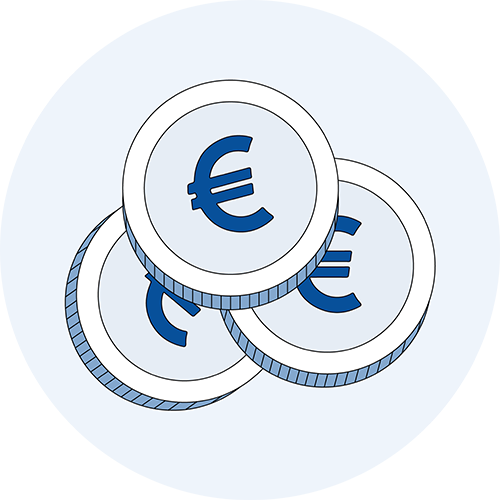EDUCAZIONE FINANZIARIA
Comprendi
l'Economia e la Banca
Scarica il Manuale "Pillole di economia e banca spiegate dal FITD"
Moneta
Risparmio
Investimento
Inflazione
Spread
Banca
Tutela dei depositi
Unione bancaria
BCE e politica monetaria
Criptovalute
Moneta | Risparmio | Investimento | Inflazione | Spread | Banca | Tutela dei depositi | Unione bancaria | BCE e politica monetaria | Criptovalute

Moneta
| Definizione |
+ |
La moneta è lo strumento di pagamento comunemente usato per acquistare beni e servizi e rappresenta l’unità di misura dei valori dei beni.
| Caratteristiche |
+ |
Accettabilità
Deve essere generalmente accettata da tutti all’interno di un sistema economico. Senza un’ampia accettazione la moneta non può svolgere efficacemente il suo ruolo di mezzo di scambio.
Divisibilità
Deve essere facilmente divisibile in unità più piccole per consentire negoziazioni di qualsiasi valore (unità di conto).
Riserva di valore
La moneta si può conservare nel tempo.
Trasportabilità
Deve essere facilmente trasportabile, permettendo agli individui di effettuare transazioni senza difficoltà.
Le banconote e le monete sono fisicamente trasportabili, mentre la moneta elettronica è trasferibile digitalmente.
Uniformità
Le unità di moneta devono essere omogenee, ossia ogni unità deve essere identica a qualsiasi altra dello stesso valore.
Stabilità di valore
Deve mantenere un valore relativamente stabile nel tempo. Una elevata inflazione può compromettere la fiducia nella moneta come riserva di valore.
| Tipologie |
+ |
Esistono diversi tipi di moneta, non tutte uguali e con caratteristiche differenti. Le principali tipologie sono:
Moneta merce
Oggetti che hanno valore intrinseco, come l’oro o l’argento, che possono essere utilizzati direttamente come moneta.
Moneta a corso legale
Moneta di Stato considerata come valido strumento legale di pagamento, che deve essere accettata come mezzo di pagamento e che può avere anche un suo valore intrinseco.
Moneta bancaria
Somme disponibili nelle banche, che possono essere utilizzate per effettuare i pagamenti.
Moneta elettronica
Si intende il valore monetario memorizzato elettronicamente rappresentato da un credito nei confronti dell’emittente, emesso a fronte della ricezione di fondi, accettato da persone fisiche o giuridiche diverse dall’emittente. Fra queste, l’euro digitale è una moneta elettronica che potrebbe essere emessa dalla Banca Centrale Europea (BCE) come completamento all’euro fisico (banconote e monete).
| Da ricordare |
+ |
Fiducia
L’ accettazione come mezzo di pagamento dipende dal grado di fiducia del pubblico nei confronti della moneta.
Facilitazione del commercio
La moneta agevola gli scambi e il commercio interno e internazionale, ampliando le possibilità di mercato.
Inflazione
Il valore della moneta può variare nel tempo a causa dell’inflazione o della deflazione.
